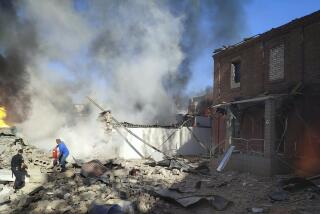Legal Risks Block Soviet Reactor Work
- Share via
BRUSSELS — Leading officials of the European nuclear power industry said Thursday that legal liability problems are preventing Western contractors from starting urgently needed repairs to nuclear power plants in the former Soviet Union.
The repairs are a vital element of Western efforts to reduce the risk to the region of another Chernobyl-like nuclear accident.
Speaking at a news conference here, Jonathan Heller, secretary general of the European Atomic Forum--Foratom--said that much of the $700 million in Western assistance pledged by the Group of Seven nations two years ago to improve safety at reactors in the former Soviet bloc had been either allocated or spent, but mainly on non-repair items such as design trouble-shooting, analysis and staff retraining.
Meanwhile, a further $1 billion earmarked for reactor hardware repairs and overhauls already available in low-interest loans from two European development banks has gone largely untouched because Western companies are declining contracts, fearing they could be held liable if an accident should occur during or after they complete the required work.
“The liability debate has been going on now for three years,” Heller said. “We’re at the point where we can’t do any more” safety-related work.
He said that in recent months there have been instances in which replacement components for Soviet-designed reactors have been ordered and produced, but not shipped to the plant for installation because of the liability question.
The only significant exception to this problem, he said, was a large twin-reactor plant at Ignalina in Lithuania, which furnished nearly 60% of the country’s electricity demands in addition to providing power to neighboring Estonia and Latvia.
The Swiss-Swedish company ABB is now engaged in repair work at the plant, which has two modified Chernobyl-style reactors.
There are now 45 nuclear reactors operating in the former Soviet Union. Foratom officials estimated that making these reactors safe will require $7 billion to $8 billion in repairs and overhauls.
German authorities simply closed down four Soviet-designed reactors and stopped construction on five others in the former East Germany after unification, concluding that it was not possible to bring them within existing national safety standards.
Heller and others said it was not economically or politically feasible in much of the former Soviet Union to simply shut down technically suspect reactors on safety grounds.
For example, Michel Lung, a technical adviser to Foratom, noted that about 40% of St. Petersburg’s electricity is generated by nuclear power. “If you start closing down these stations, the result is that very many people will freeze to death,” Heller said.
More to Read
Sign up for Essential California
The most important California stories and recommendations in your inbox every morning.
You may occasionally receive promotional content from the Los Angeles Times.













